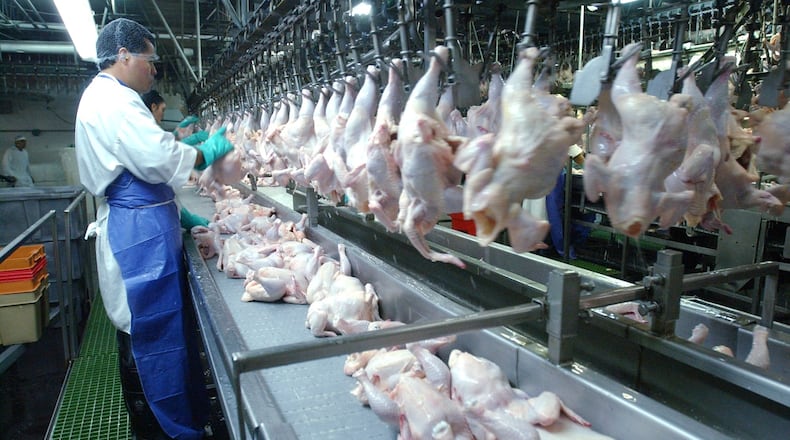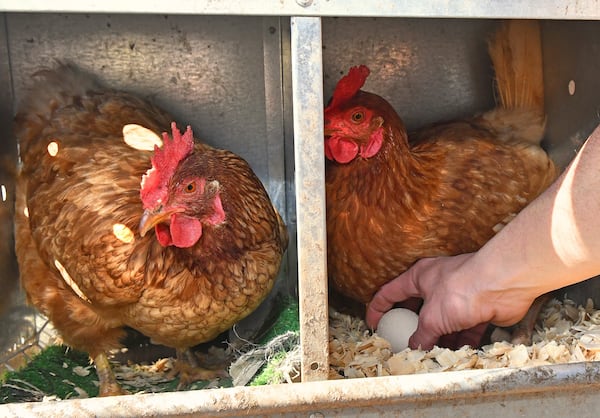The chicken can cross the road, but can it cross the border?
That’s become a pertinent question for Georgia’s nation-leading poultry industry as trade wars escalate and highly contagious bird flu outbreaks threaten flocks.
China on Friday blocked business from six American agriculture companies, including two Georgia-based poultry firms, citing the detection of bacteria or banned chemicals within imported processed chicken products. The restrictions on those companies were announced alongside 34% retaliatory tariffs on all American goods, mirroring the tariffs President Donald Trump levied on the Asian global power days earlier.
Trump on Monday threatened to slap China with an additional 50% tariff punishment on all its American exports if the international adversary didn’t back down. The White House said Tuesday afternoon the higher tariffs would take effect at midnight.
“Countries like China, who have chosen to retaliate and try to double down on their mistreatment of American workers, are making a mistake,” White House Press Secretary Karoline Leavitt said. “President Trump has a spine of steel, and he will not break.”
On Wednesday, China raised its tariffs to 84% on goods coming from the U.S. in an additional countermeasure, the Associated Press reported.
Tariffs, which are taxes on imported goods, are being used as the fiscal policy equivalent of a game of chicken, with countries raising the stakes and calling each other’s bluff on whether to capitulate or endure higher prices. Raising tariffs — or issuing blanket bans — on American agriculture has emerged as an easy target for foreign powers, and it’s a tactic that leaves some segments of Georgia vulnerable.
“Where Georgia is most exposed on tariffs is agribusiness,” Christopher Fagan, a partner with accounting firm Moore Colson in Cobb County, told The Atlanta Journal-Constitution. “… On reciprocal tariffs, China is more punitive than most. They just quit buying.”
Despite its reputation as the Peach State, poultry rules the roost in Georgia. It’s the most valuable segment of the state’s agriculture sector and is worth an estimated $6.7 billion, according to a University of Georgia analysis based on 2022 data, the most recent year available.
Modern farming produces far more chicken, peanuts, pecans and blueberries than Americans can eat, leading to large amounts being shipped overseas. Sina Golara, assistant professor of management at Georgia State University’s Robinson College of Business, said tariffs and product bans place tightly integrated agriculture supply chains in a bind.
“For American farmers, who often operate on tight margins, an additional increase in export tariffs can be devastating,” he said in written comments. “Some small- and medium-sized farms may struggle to remain competitive, potentially forcing some to shut down.”
Credit: Chris Hunt
Credit: Chris Hunt
A key trading partner
Tariffs could serve as a double whammy for the poultry industry, which is already grappling with widespread disruption brought by bird flu.
Egg prices — an oft-quoted economic indicator used to represent staple groceries — have starkly risen since 2023, largely because of outbreaks of the H5N1 strain of Highly Pathogenic Avian Influenza. It’s a virus that has ravaged wild birds, commercial poultry and some mammal species across the U.S. during the outbreak.
China issued a blanket ban on nearly all American raw poultry imports in late 2023 in response to early bird flu outbreaks, roughly around the same time a commercial duck farm in Georgia detected the state’s first confirmed H5N1 infection. Early this year, two commercial chicken flocks had positive bird flu cases.
As a result of the ban, Georgia’s poultry exports to China decreased 66% in 2024 compared to the prior year, according to data from the U.S. Department of Agriculture. While China is the third-largest buyer of U.S. agricultural products, it is Georgia’s top foreign poultry importer, followed by Canada and Mexico.
China still allows the import of precooked poultry products that originate in the U.S., which is the primary focus of the companies China added to its banned list Friday.
China’s General Administration of Customs said companies were targeted because Chinese customs detected excessive levels of the mycotoxin zearalenone and mold in imported U.S. sorghum, and salmonella in imported U.S. poultry meat and bone meal. Those claims have not been substantiated by U.S. testing, and a spokesperson for one of the affected companies, Texas-based Darling Ingredients Inc, told The New York Times it had not received any complaints about its product shipments to China.
The two Georgia-based companies are Coastal Processing LLC, which is based in the small Jefferson County city of Louisville, and American Proteins Inc., the former name of a Cumming-based subsidiary of poultry giant Tyson Foods. Neither company responded to requests for comment.
Greg Tyler, president and CEO of the metro Atlanta-based USA Poultry and Egg Export Council, has warned that escalating tariffs and retaliation could ripple through America’s agrarian supply chain, a sentiment he reiterated Monday.
“We are concerned that the escalation of trade tensions will shut down, temporarily at least, our ability to trade with a key trade partner (in China) through increased tariffs and announced facility suspensions,” Tyler said in a written statement. “… Any deescalation of the current tensions will also hopefully see these long-standing barriers removed for this key market.”
Fair trade
China has indicated it will not back down. Lin Jian, the spokesperson for China’s foreign ministry, said Monday during a news conference that Americans will not be spared financial pain if tariffs continue.
“What the U.S. has done is a typical move of unilateralism, protectionism and economic bullying,” Jian said. “It will hurt the U.S. itself as well as others.”
Darling, a publicly traded company, issued a news release saying that the “vast majority of the ingredients we produce in the U.S. are utilized domestically, with minimal exposure to exports impacted by current tariffs, including to China.” A company spokesperson declined to provide additional information, referring an AJC reporter to the release.
“We do not believe these current developments are material to our business,” the statement said.
While tariffs have roiled the stock market and raised fears of an imminent recession, Trump has maintained that they’re a critical tool needed to rewrite trade clauses he deems as unfair. Tyler said China has taken various actions to limit American poultry trade in recent years, such as dismissing trade agreement protocols to lift import restrictions once bird flu cases have been remedied.
Mike Giles, president of the Georgia Poultry Federation, declined to speak on what China’s bans might mean for the impacted companies, but he said revisiting trade policies will likely benefit the state’s chicken industry over the long term.
“Georgia poultry producers can compete in any market in the world when the trading terms are fair,” he said. “That’s the outcome we hope for in these negotiations.”
About the Author
Keep Reading
The Latest
Featured






